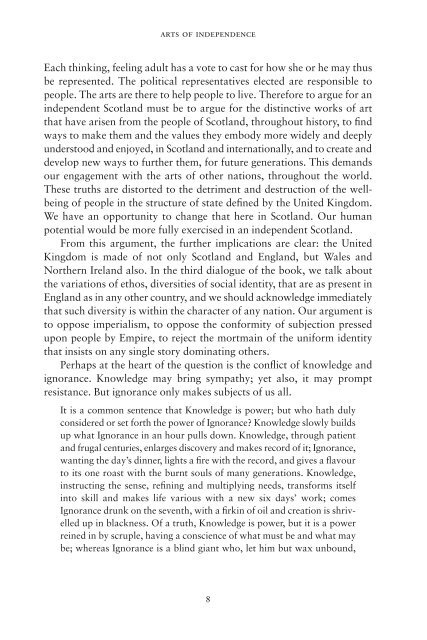Arts of Independence by Alexander Moffat and Alan Riach sampler
ALEXANDER MOFFAT and ALAN RIACH take a hard look at the most neglected aspect of the argument for Scotland’s distinctive national identity: the arts. Their proposition is that music, painting, architecture and, pre-eminently, literature, are the fuel and fire that makes imagination possible. Neglect them at your peril. For Moffat and Riach, jobs, health and trade are matters of material fact that need to be enlivened by imagination. How can we organise society to help us approach what the arts have to give. Why have we been so poor at representing our arts comprehensively, both within Scotland and internationally? What can be done? How might things be different? The arts are of paramount importance in the modern world. Moffat and Riach take the argument out of the hands of politicians and economists and beyond the petty squabbles of party politics.
ALEXANDER MOFFAT and ALAN RIACH take a hard look at the most neglected aspect of the argument for Scotland’s distinctive national identity: the arts. Their proposition is that music, painting, architecture and, pre-eminently, literature, are the fuel and fire that makes imagination possible. Neglect them at your peril. For Moffat and Riach, jobs, health and trade are matters of material fact that need to be enlivened by imagination. How can we organise society to help us approach what the arts have to give. Why have we been so poor at representing our arts comprehensively, both within Scotland and internationally? What can be done? How might things be different? The arts are of paramount importance in the modern world. Moffat and Riach take the argument out of the hands of politicians and economists and beyond the petty squabbles of party politics.
- No tags were found...
Create successful ePaper yourself
Turn your PDF publications into a flip-book with our unique Google optimized e-Paper software.
arts <strong>of</strong> independence<br />
Each thinking, feeling adult has a vote to cast for how she or he may thus<br />
be represented. The political representatives elected are responsible to<br />
people. The arts are there to help people to live. Therefore to argue for an<br />
independent Scotl<strong>and</strong> must be to argue for the distinctive works <strong>of</strong> art<br />
that have arisen from the people <strong>of</strong> Scotl<strong>and</strong>, throughout history, to find<br />
ways to make them <strong>and</strong> the values they embody more widely <strong>and</strong> deeply<br />
understood <strong>and</strong> enjoyed, in Scotl<strong>and</strong> <strong>and</strong> internationally, <strong>and</strong> to create <strong>and</strong><br />
develop new ways to further them, for future generations. This dem<strong>and</strong>s<br />
our engagement with the arts <strong>of</strong> other nations, throughout the world.<br />
These truths are distorted to the detriment <strong>and</strong> destruction <strong>of</strong> the wellbeing<br />
<strong>of</strong> people in the structure <strong>of</strong> state defined <strong>by</strong> the United Kingdom.<br />
We have an opportunity to change that here in Scotl<strong>and</strong>. Our human<br />
potential would be more fully exercised in an independent Scotl<strong>and</strong>.<br />
From this argument, the further implications are clear: the United<br />
Kingdom is made <strong>of</strong> not only Scotl<strong>and</strong> <strong>and</strong> Engl<strong>and</strong>, but Wales <strong>and</strong><br />
Northern Irel<strong>and</strong> also. In the third dialogue <strong>of</strong> the book, we talk about<br />
the variations <strong>of</strong> ethos, diversities <strong>of</strong> social identity, that are as present in<br />
Engl<strong>and</strong> as in any other country, <strong>and</strong> we should acknowledge immediately<br />
that such diversity is within the character <strong>of</strong> any nation. Our argument is<br />
to oppose imperialism, to oppose the conformity <strong>of</strong> subjection pressed<br />
upon people <strong>by</strong> Empire, to reject the mortmain <strong>of</strong> the uniform identity<br />
that insists on any single story dominating others.<br />
Perhaps at the heart <strong>of</strong> the question is the conflict <strong>of</strong> knowledge <strong>and</strong><br />
ignorance. Knowledge may bring sympathy; yet also, it may prompt<br />
resistance. But ignorance only makes subjects <strong>of</strong> us all.<br />
It is a common sentence that Knowledge is power; but who hath duly<br />
considered or set forth the power <strong>of</strong> Ignorance? Knowledge slowly builds<br />
up what Ignorance in an hour pulls down. Knowledge, through patient<br />
<strong>and</strong> frugal centuries, enlarges discovery <strong>and</strong> makes record <strong>of</strong> it; Ignorance,<br />
wanting the day’s dinner, lights a fire with the record, <strong>and</strong> gives a flavour<br />
to its one roast with the burnt souls <strong>of</strong> many generations. Knowledge,<br />
instructing the sense, refining <strong>and</strong> multiplying needs, transforms itself<br />
into skill <strong>and</strong> makes life various with a new six days’ work; comes<br />
Ignorance drunk on the seventh, with a firkin <strong>of</strong> oil <strong>and</strong> creation is shrivelled<br />
up in blackness. Of a truth, Knowledge is power, but it is a power<br />
reined in <strong>by</strong> scruple, having a conscience <strong>of</strong> what must be <strong>and</strong> what may<br />
be; whereas Ignorance is a blind giant who, let him but wax unbound,<br />
8


















